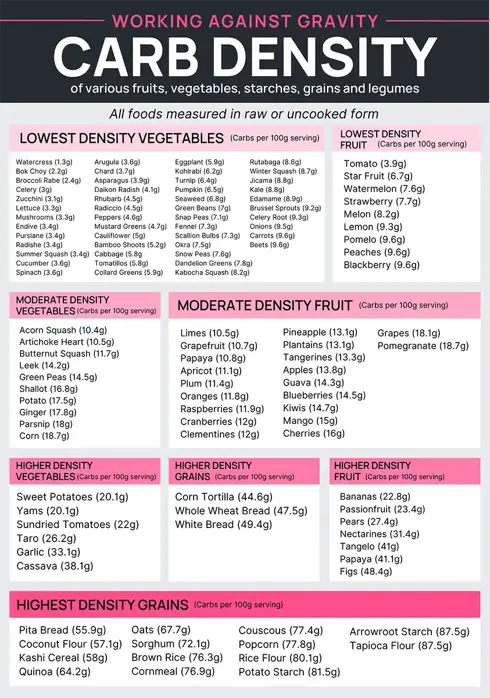Wondering how many carbs you need for weight loss or muscle gain? WAG members have been asking this question of their coaches since we started all the way back in 2014.
There are many moving pieces to this question—especially because no two people’s bodies or goals are exactly the same. But there are a few general guidelines that can help you answer this question for yourself.
Today, we’re covering how many carbs you should eat each day, the role of carbohydrates in your body and in training and recovery, and where you can find the carb sources you need to feel and perform at your best.

What Do Carbohydrates Do In Your Body?
Knowing the role carbs play in your body is the first step in deciding how many carbohydrates you need each day.
Advertisement
Carbohydrates (aka “carbs”) are single sugar units that provide short-term energy. They’re stored and used in two primary places: glycogen in your liver to maintain blood sugar levels and in your muscles to fuel movement and exercise.
Those following a Ketogenic Diet manipulate carbohydrate intake, and WAG Nutrition coaches are trained to support keto clients successfully. That being said, we’ve generally seen that those who want to optimize performance need to eat more carbs. The more active you are and the muscle you have, the more carbs you need to sustain your activity, recovery, and muscle mass.
Where Can I Find Carbohydrates?
Carbohydrates are mainly found in grains, fruits, and starchy vegetables and can be broken down by density. Higher-density carbohydrates have more carbs per serving than their lower-density counterparts. Higher-density carbohydrates are usually higher on the glycemic index; your body breaks them down more quickly than lower-density carbohydrates

Carbs, Training, and Recovery
Carbohydrates are your body’s preferred source of energy for high-intensity exercise, strength training, and daily movement. They also play a vital role in refilling your glycogen stores during recovery post-workout.
Advertisement
The closer you are to a workout, the more high-GI carbs and fewer low-GI carbs you should eat. You want your body to utilize the carbs you give it quickly, and high GI carbs hit your bloodstream faster than low GI carbs.
Want more specific information about fueling for your workouts? Check out this article.
How Many Carbohydrates Do You Need to Lose Weight or Gain Muscle?
That is the million-dollar question, isn’t it? Because macros are made up of calories, the first step in determining your daily macro needs for yourself is calculating your daily calorie needs.
Then, all it takes is a bit of math. Use the free guide below to determine your baseline calorie and carbohydrate needs based on your goals.
Advertisement
As you determine carbohydrate needs comes down to two main things:
- Your goals
- Your preferences
If you want to prioritize performance and/or prefer higher-carb foods, allocate more calories to carbs. They’ll help fuel you for both training and recovery. This likely means you’ll want a macro breakdown that looks something like…
30% Protein | 25% Fat | 45% Carbohydrates
If you prefer higher-fat foods, you may want to allocate more calories to fats. In this case, try a calorie breakdown closer to…
30% Protein | 30% Fat | 40% Carbohydrates
Advertisement
There you have it, an outline of how to determine how many carbs you need based on your goals. If you’re still feeling a little confused, a nutrition coach can help. Our team of experienced coaches has helped over 30,000 people find the best macro breakdown based on their goals, body, lifestyle, and more!








